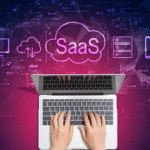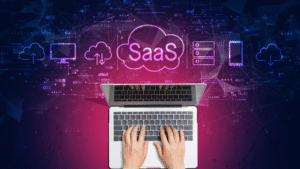The global self-service Business Intelligence (BI) market will increase to USD 26.54 billion by 2032, according to Fortune Business Insights. BI enables organizations to convert raw data into actionable insights, anticipate market trends, and make smarter business decisions. Companies that leverage BI tools can boost customer satisfaction, improve operational efficiency, and achieve sustained revenue growth.
What Does NetSuite Business Intelligence Include?
NetSuite Business Intelligence (BI) combines ERP data with analytics tools to deliver real-time, actionable insights. SuiteAnalytics provides customizable dashboards, saved searches, and embedded reporting features that help organizations track KPIs and measure performance across finance, sales, and operations.
NetSuite Analytics Warehouse (NSAW), a cloud-based data warehouse, processes large volumes of ERP and external data. Its advanced query performance and scalability enable deeper analytics and faster insights, empowering businesses to build a tailored BI environment.
Where Does AI Fit into NetSuite Today?
AI in NetSuite is currently available at a beta and emerging stage, designed to support users with productivity-focused features rather than core ERP modules. While it’s not yet fully embedded into every process, these AI capabilities are paving the way for more intelligent automation and decision-making.
Key AI-driven offerings include:
- NetSuite Expert for SuiteAnswers: Uses retrieval-augmented generation (RAG) to deliver context-sensitive help directly within NetSuite. This reduces training time, improves self-service, and allows users to troubleshoot issues faster.
- Text Enhance: Automates data entry in custom text fields, improving accuracy and reducing manual errors. Finance, HR, and operations teams can save time on repetitive tasks and focus on higher-value activities.
- Prompt Management API: Provides centralized management of prompts for large language models (LLMs). This allows developers and admins to design and customize AI-powered workflows that align with business processes.
These AI features complement predictive analytics and anomaly detection, which use historical ERP data to forecast revenue, identify demand trends, and flag unusual transactions. For example, finance teams can detect compliance risks early, while retail companies can optimize inventory for seasonal demand.
NetSuite Analytics Warehouse vs External BI Tools
NSAW integrates natively within the NetSuite ecosystem, offering a unified solution with minimal maintenance. External BI tools like Power BI or Tableau provide advanced visualization and multi-source data integration but require additional setup and expertise. Choosing between them depends on the complexity of your reporting needs, budget, and IT resources.
Ensuring Data Governance and Security with NetSuite
Data governance is at the heart of BI success. NetSuite provides robust role-based access controls, field-level security, and encryption for sensitive data. This ensures compliance with industry standards while protecting business-critical information.
Why Self-Service BI Matters
NetSuite’s self-service BI tools empower non-technical users across departments. With drag-and-drop dashboards, saved searches, and customizable reports, teams in finance, sales, and marketing can analyze data independently without waiting for IT support.
- Finance teams gain real-time visibility into cash flow, expenses, and budgets.
- Sales teams track pipeline performance and forecast revenue.
- Marketing teams segment customers and measure campaign ROI.
Taking the Next Step Toward Smarter Business Intelligence
By combining NetSuite ERP, SuiteAnalytics, and NetSuite AI features, organizations can achieve smarter, data-driven decision-making. While AI in NetSuite is still evolving, early adopters benefit from productivity gains, better compliance, and more intuitive self-service capabilities.
Ready to explore how NetSuite BI and AI can support your business growth? Book a free consultation today and see how your ERP data can work harder for you.
FAQs
What’s the timeline to implement a NetSuite BI solution?
The timeline depends on the volume of data, process complexity, and specific requirements. A basic NetSuite BI setup can take a few weeks, while an advanced implementation that includes NetSuite Analytics Warehouse (NSAW) or external BI integrations may take a few months.
Can small to mid-sized businesses use AI and self-service BI within NetSuite?
Yes. NetSuite BI is designed to be user-friendly and scalable, making it accessible for businesses of all sizes. Self-service BI features like SuiteAnalytics and saved searches are ideal for SMBs, while emerging AI tools such as Text Enhance and NetSuite Expert for SuiteAnswers help optimize resources without requiring large IT teams.
How does NetSuite ensure that data used in BI is of good quality?
NetSuite has built-in mechanisms to maintain high data quality:
- Validation rules at the point of entry
- Mandatory fields for critical records
- Automated data cleansing processes
- Role-based access controls to prevent unauthorized changes
Is a separate data warehouse always necessary, or is SuiteAnalytics enough?
For organizations relying primarily on NetSuite ERP data and standard reporting, SuiteAnalytics is sufficient. NetSuite Analytics Warehouse (NSAW) is recommended if you need to consolidate large volumes of data from multiple sources or perform advanced analytics.
Is AI fully integrated into NetSuite BI today? AI in NetSuite is still in beta and focused on specific features. Current AI tools include NetSuite Expert for SuiteAnswers (RAG-based self-service help), Text Enhance (AI-powered data entry), and the Prompt Management API (for customizing AI workflows). These enhance productivity and accuracy but are not yet embedded across all core NetSuite ERP modules.









